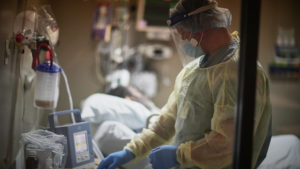
Pfizer CEO, Albert Bourla, announced Friday in an open letter that the pharmaceutical company developing a COVID-19 vaccine will not request an emergency authorization before mid-November – meaning that the file of the vaccine candidate that is regarded as the front-runner in the global race to get a vaccine to market would only be reviewed after the US presidential elections.
Pfizer said that it would continue running the trial through final analyses before seeking an emergency authorization from the US Food and Drug Administration (FDA). Moderna is also expected to submit the file for its vaccine around the same time.
“Assuming positive data, Pfizer will apply for Emergency Authorization Use in the US soon after the safety milestone is achieved in the third week of November,” said Bourla.
Bourla emphasized the three key areas Pfizer prioritized for public use of the vaccine: vaccine efficacy, safety, and high quality and consistent manufacturing. These were also highlighted by Mike Ryan, Executive Director of WHO Health Emergencies Program, at a WHO press briefing on Friday.
“It’s not just about the safety and efficacy of vaccines. It’s the quality of the vaccine as well,” and good manufacturing practices contribute to developing a high quality vaccine, said Ryan.
[huge_it_slider id=”15″]These practices and steps, along with transparency, are necessary to provide reassurance to populations and improve public trust. Bourla noted Pfizer’s commitment to transparency and the importance of clarity in the context of “critical public health considerations.”
“To ensure public trust and clear up a great deal of confusion, I believe it is essential for the public to understand our estimated timelines for each of these three areas,” Bourla said.
The timeline of COVID-19 vaccines has been highly politicized, particularly by US President Donald Trump in his campaigning for re-election. Bourla previously lambasted the President for his politicization of the independent, scientific process of vaccine development and approval.
Earlier in October, Bourla published an open letter saying that the company “would never succumb to political pressure” and is “moving at the speed of science.”
Pfizer previously had an accelerated timeline compared to the other leading vaccine candidates in the US, due to the shorter interval between the two-doses of the vaccine. Moderna announced in early October that it would not seek Emergency Authorization until after November 25 and Johnson & Johnson’s Phase 3 vaccine trial was “paused” earlier this week for a participant illness.
NIH Begins Clinical Trial on Immune Modulator Treatments for COVID-19

Meanwhile, a new Phase 3 clinical trial was launched by the US National Institutes of Health (NIH) to evaluate the efficacy of three immune-modulating therapies in reducing the need for ventilators and the duration of hospital stays.
Immune-modulating therapies are drugs that alter the way the immune system works. The therapies will be examined for their ability to suppress an immune response that sometimes occurs in COVID-19 patients, where the immune system releases excessive amounts of proteins that lead to inflammation and life-threatening complications.
[huge_it_slider id=”15″]The trial will be part of the NIH’s Accelerating COVID-19 Therapeutic Interventions and Vaccines (ACTIV) initiative, a public-private partnership established in April to coordinate research strategies to speed up development of treatments and vaccines.
“This is the fifth master protocol to be launched under the ACTIV partnership in an unprecedented timeframe, and focuses efforts on therapies that hold the greatest promise for treating COVID-19,” said Francis S. Collins, Director of NIH. “Immune modulators provide another treatment modality in the ACTIV therapeutic toolkit to help manage the complex, multi-system conditions that can be caused by this very serious disease.”
The clinical trial will evaluate Remicade, developed by Johnson & Johnson’s Janssen Research unit, Bristol Myers Squibb’s Orencia, and AbbVie’s Cenicriviroc. Approximately 2,100 hospitalized adults with moderate to severe COVID-19 symptoms will be enrolled in the study that will last six months.
All trial participants will receive Remdesivir, due to the current standard of care treatment of hospitalized COVID-19 patients. It is unclear if the interim results of the WHO’s Solidarity Trial on Remdesivir will impact the guidelines on standard of care treatment.
Image Credits: Flickr – World Economic Forum, Flickr – US Navy.
